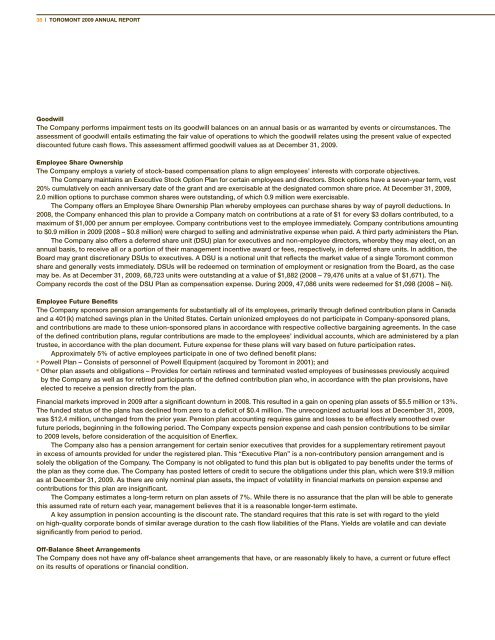2009 Annual Report - Toromont Industries Ltd.
2009 Annual Report - Toromont Industries Ltd.
2009 Annual Report - Toromont Industries Ltd.
Create successful ePaper yourself
Turn your PDF publications into a flip-book with our unique Google optimized e-Paper software.
38 | TOROMONT <strong>2009</strong> ANNUAL REPORT<br />
Goodwill<br />
The Company performs impairment tests on its goodwill balances on an annual basis or as warranted by events or circumstances. The<br />
assessment of goodwill entails estimating the fair value of operations to which the goodwill relates using the present value of expected<br />
discounted future cash flows. This assessment affirmed goodwill values as at December 31, <strong>2009</strong>.<br />
Employee Share Ownership<br />
The Company employs a variety of stock-based compensation plans to align employees’ interests with corporate objectives.<br />
The Company maintains an Executive Stock Option Plan for certain employees and directors. Stock options have a seven-year term, vest<br />
20% cumulatively on each anniversary date of the grant and are exercisable at the designated common share price. At December 31, <strong>2009</strong>,<br />
2.0 million options to purchase common shares were outstanding, of which 0.9 million were exercisable.<br />
The Company offers an Employee Share Ownership Plan whereby employees can purchase shares by way of payroll deductions. In<br />
2008, the Company enhanced this plan to provide a Company match on contributions at a rate of $1 for every $3 dollars contributed, to a<br />
maximum of $1,000 per annum per employee. Company contributions vest to the employee immediately. Company contributions amounting<br />
to $0.9 million in <strong>2009</strong> (2008 – $0.8 million) were charged to selling and administrative expense when paid. A third party administers the Plan.<br />
The Company also offers a deferred share unit (DSU) plan for executives and non-employee directors, whereby they may elect, on an<br />
annual basis, to receive all or a portion of their management incentive award or fees, respectively, in deferred share units. In addition, the<br />
Board may grant discretionary DSUs to executives. A DSU is a notional unit that reflects the market value of a single <strong>Toromont</strong> common<br />
share and generally vests immediately. DSUs will be redeemed on termination of employment or resignation from the Board, as the case<br />
may be. As at December 31, <strong>2009</strong>, 68,723 units were outstanding at a value of $1,882 (2008 – 79,476 units at a value of $1,671). The<br />
Company records the cost of the DSU Plan as compensation expense. During <strong>2009</strong>, 47,086 units were redeemed for $1,098 (2008 – Nil).<br />
Employee Future Benefits<br />
The Company sponsors pension arrangements for substantially all of its employees, primarily through defined contribution plans in Canada<br />
and a 401(k) matched savings plan in the United States. Certain unionized employees do not participate in Company-sponsored plans,<br />
and contributions are made to these union-sponsored plans in accordance with respective collective bargaining agreements. In the case<br />
of the defined contribution plans, regular contributions are made to the employees’ individual accounts, which are administered by a plan<br />
trustee, in accordance with the plan document. Future expense for these plans will vary based on future participation rates.<br />
Approximately 5% of active employees participate in one of two defined benefit plans:<br />
n Powell Plan – Consists of personnel of Powell Equipment (acquired by <strong>Toromont</strong> in 2001); and<br />
n Other plan assets and obligations – Provides for certain retirees and terminated vested employees of businesses previously acquired<br />
by the Company as well as for retired participants of the defined contribution plan who, in accordance with the plan provisions, have<br />
elected to receive a pension directly from the plan.<br />
Financial markets improved in <strong>2009</strong> after a significant downturn in 2008. This resulted in a gain on opening plan assets of $5.5 million or 13%.<br />
The funded status of the plans has declined from zero to a deficit of $0.4 million. The unrecognized actuarial loss at December 31, <strong>2009</strong>,<br />
was $12.4 million, unchanged from the prior year. Pension plan accounting requires gains and losses to be effectively smoothed over<br />
future periods, beginning in the following period. The Company expects pension expense and cash pension contributions to be similar<br />
to <strong>2009</strong> levels, before consideration of the acquisition of Enerflex.<br />
The Company also has a pension arrangement for certain senior executives that provides for a supplementary retirement payout<br />
in excess of amounts provided for under the registered plan. This “Executive Plan” is a non-contributory pension arrangement and is<br />
solely the obligation of the Company. The Company is not obligated to fund this plan but is obligated to pay benefits under the terms of<br />
the plan as they come due. The Company has posted letters of credit to secure the obligations under this plan, which were $19.9 million<br />
as at December 31, <strong>2009</strong>. As there are only nominal plan assets, the impact of volatility in financial markets on pension expense and<br />
contributions for this plan are insignificant.<br />
The Company estimates a long-term return on plan assets of 7%. While there is no assurance that the plan will be able to generate<br />
this assumed rate of return each year, management believes that it is a reasonable longer-term estimate.<br />
A key assumption in pension accounting is the discount rate. The standard requires that this rate is set with regard to the yield<br />
on high-quality corporate bonds of similar average duration to the cash flow liabilities of the Plans. Yields are volatile and can deviate<br />
significantly from period to period.<br />
Off-Balance Sheet Arrangements<br />
The Company does not have any off-balance sheet arrangements that have, or are reasonably likely to have, a current or future effect<br />
on its results of operations or financial condition.




